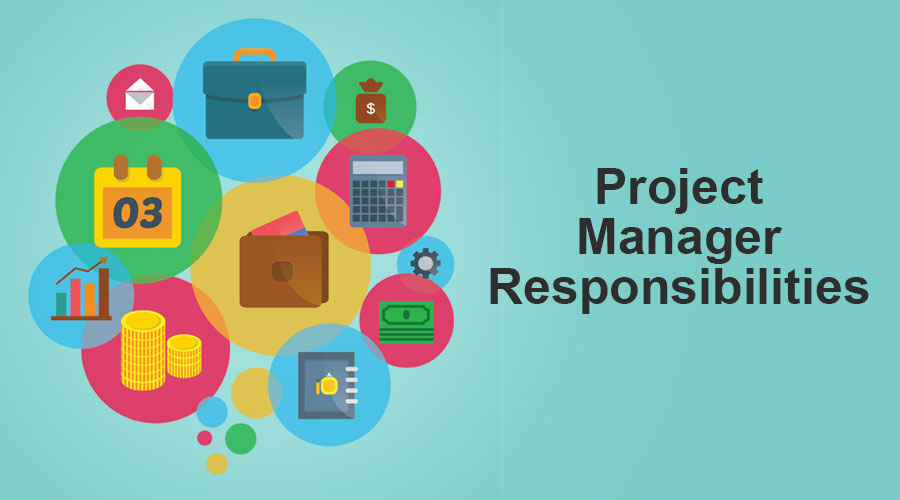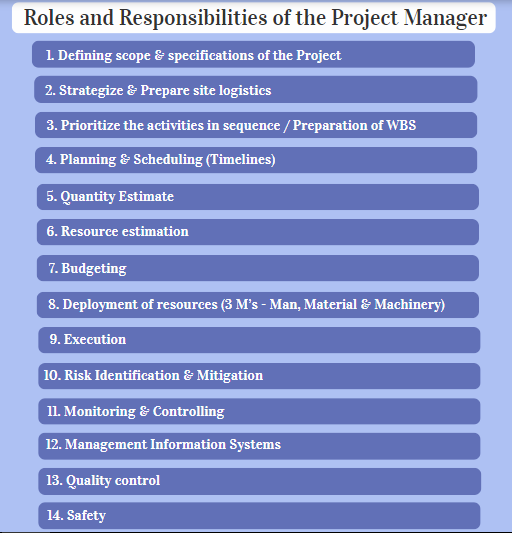Updated May 22, 2023

Role of Project Manager Responsibilities
A project manager is an individual (or) a person who drives the project management to achieve a specified set of goals or targets within stipulated timelines by optimum utilization of resources. In this topic, we are going to learn about Project Manager Responsibilities.
The construction industry is a massive and ever-growing industry that is further classified into different sectors like Real estate (Residential, commercial buildings, etc.), Infrastructure (Roads, Bridges, etc.), Industrial (Power plants, Factories, etc.), Water supply projects (Dams, Canals, Supply line & Treatment plants, etc.) where every project is bound with a variable set of timelines & constraints and Project Manager is a single entity who shall handle the project from Pre-initiation stage to Post-construction (or) Handing over the stage.
Plan » Deploy / Procure » Execute » Control » Deliver » Handover
Roles and Responsibilities of Project Manager
The Roles & Responsibilities of the project manager in the construction industry are as follows:
1. Defining the scope & specifications of the project
Every project shall have a different set of scope & specifications. For example, the specifications of a residential project include 3 basements, a ground floor, ten floors, a terrace, connecting podium area, and a clubhouse with a swimming pool.
2. Strategize & prepare site logistics
We divide the available space into different parts according to the execution strategy. We plot the available area and allocate separate space as follows:
- Construction area
- Site office
- Material stacking yard
- Location of machinery (Tower crane, Concrete pump, Batching plant, etc.)
- Inward & Outward movement of vehicles & materials
- Labor colony / Accommodation for labor
- Staff quarters etc
3. Prioritize the activities in sequence/preparation of WBS (Work Breakdown Structure)
- The project team prepares a work breakdown structure (WBS), which lists all the activities involved.
- We prioritize the completion of activities in the primary set of WBS.
For example, Any residential project shall require the completion of the main building (consisting of flats) for handing over the project to the customer. So to maximize sales, the execution of clubhouses (considered as over and above comforts) shall be considered in the pre-final stage of the project & the Major building area (consisting of flats) shall be prioritized.
4. Planning & scheduling (Timelines)
- After finalizing the WBS, we allocate all the activities within prescribed timelines, ensuring project completion within stipulated timelines.
- All the activities and their respective interdependencies are worked out and linked accordingly using project management software like MSP, Primavera, etc.
5. Quantity estimate
- The Quantum of materials required for the project is estimated or calculated based on design/drawings provided by the Architect & Structural team.
- Available material used in construction is Cement, Steel, Aggregate, Sand, Brick / Blocks, Plywood/pinewood (for Shuttering), Gypsum (for plaster), Doors, Windows, Tiles / Marble / Granite (for Flooring, etc.).
- Based on the above estimate & planning, a material requirement schedule is prepared by the project manager and submitted to the procurement team for further processing.
6. Resource estimation
- Based on the Quantum of work & timelines, the project manager shall work out the resource requirement, i.e., Estimation of the number of laborers (or) machinery required.
For example, 2 Masons shall complete 10 square meters of brickwork in 1 day; then, the project manager shall plan and deploy 4 Masons to complete the same work in 0.5 days.
- Machinery is an integral part of construction, where multiple types of machinery are available in the market based on project specifications. The project manager shall shortlist the machinery per the project requirement and further procure the same, considering budgeting assumptions.
7. Budgeting
- Budgeting is one of the major portfolios of a project manager. All the quantities of materials & resources (Staff, labor, machinery, etc.) requirements that are worked out earlier are converted into cost, and the project manager shall prepare the budget by the cost allotted by the management and subsequent expectations of the customer.
- The project manager shall propose the best budget to the management after conducting a rigorous exercise on different options and clearly stating the necessary assumptions and benefits for further approval.
- Once the management approves the budget, the project manager shall start with the resource deployment and execution.
8. Deployment of resources (3 M’s – Man, Material & Machinery)
As per budgetary provisions, the project manager shall negotiate with vendors in coordination with the procurement & contracts team and deploy the required Manpower, Material & Machinery at the site for execution.
9. Execution
- Based on strategy & planning project manager shall start execution with the site team consisting of Engineers, Supervisors with specialized trade, i.e., Engineer – Shell & core (Structural part) & Engineer – Finishing (Interior flat finishes).
- In this stage project manager shall coordinate & lead the team of planning, billing, execution & quality and ensures that the project is well within the schedule, budget, quality, etc.
10. Risk identification & mitigation
One of the essential roles of a project manager is to identify the potential risks of projects which are about to occur or have already occurred in the project and find a way out or mitigation measures for the same.
11. Monitoring & controlling
- The project manager shall monitor the project on a daily, weekly & monthly basis, and project progress is evaluated based on Time, cost & quality parameters & any overheads or deviations in these parameters are identified, and necessary compensatory measures are worked out.
- Necessary Material & labor reconciliations are carried out regularly to ensure the project is always in prescribed budgetary provisions.
12. Management information systems
- The project manager is accountable for every aspect of the project, and management shall evaluate their performance on their commitments & value additions to the project.
- All the progress & financial aspects of the project are captured & documented in the required formats and presented to management on a weekly/monthly basis.
For example, WPR (weekly progress report), MPR (Monthly progress report), CPD (Critical Path Delay Report), CCR (Cost center report), etc.
13. Quality control
- We can consider customer satisfaction as a key evaluation parameter for any project. The welfare of any company in the construction industry is purely dependent on customer satisfaction. Every valued customer shall always expect a difference between conventional products & a good quality product.
- One of the most important responsibilities of the project manager is to always maintain top-notch quality in the product and ensure 100% customer satisfaction.
14. Safety
According to the BOCW (Building & Other Construction Workers) Act, all laborers must work in a safe & healthy environment. So maintaining & following efficient safety measures at the site is also an integral responsibility of a project manager.
Recommended Articles
This is a guide to the Project Manager Responsibilities. Here we discuss the roles & responsibilities of the project manager in the construction industry. You can also go through our other suggested articles to learn more –

